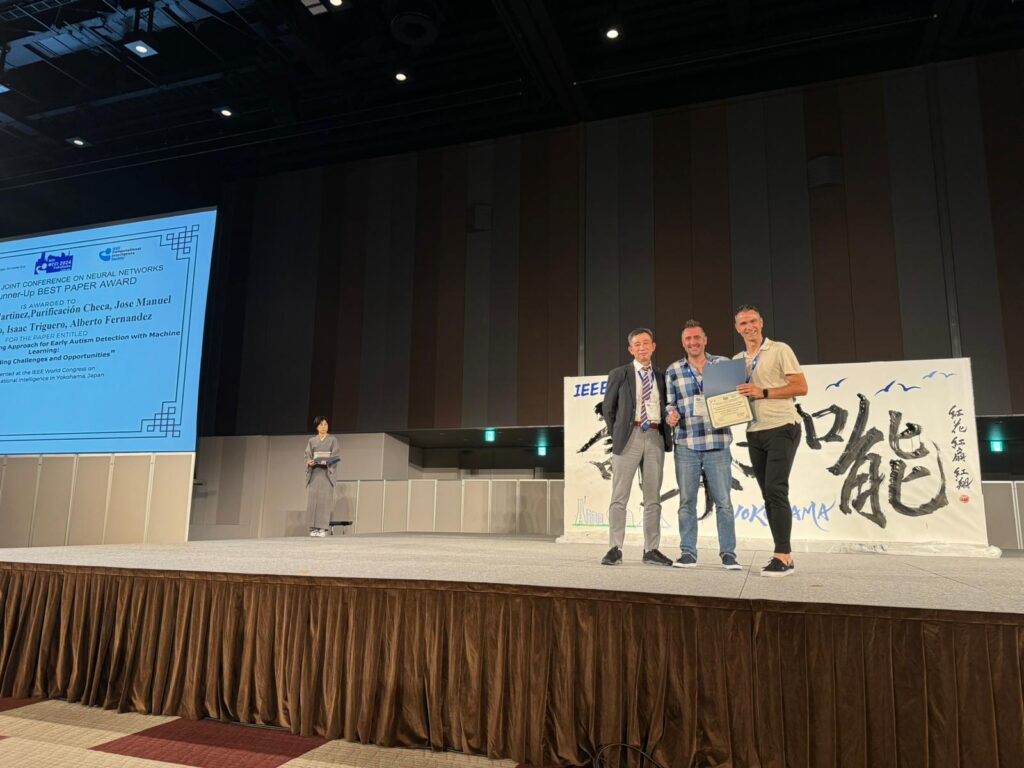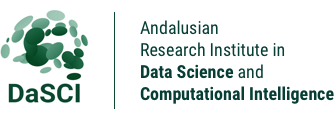2 awards for DaSCI at the World Conference on Computational Intelligence 2024 in Japan
8 July, 2024
- The first prize went to a paper on one of the fundamental problems of AI, the robustness of an open system. The second prize goes to the direct application of AI to the early detection of ASD.
- The conference is one of the most important international conferences in the area of machine learning and neural networks, bringing together theory, analysis and applications in machine learning, with special emphasis on the field of neural networks and deep learning.
The Artificial Intelligence research carried out in Granada has been recognised once again. This time at the World Conference on Computational Intelligence 2024 held from 30 June to 5 July in Yokohama, Japan. The World Conference on Computational Intelligence 2024 includes the 3 most important conferences on computational intelligence technologies (neural networks and deep learning IJCNN, evolutionary computation CEC2024, and ensemble technologies and fuzzy systems Fuzz-IEEE2024).

The conference was the largest ever held with more than 3,250 papers received and 1,681 accepted, with authors from more than 80 countries and 20 tutorials and 5 parallel workshops. A total of more than 2000 AI researchers from all over the world have gathered for this conference. It is one of the most important international conferences in the area of machine learning and neural networks, bringing together theory, analysis and applications in machine learning, with special emphasis on the field of neural networks and deep learning.
Two award-winning works
The article that has received the first prize (2024 BEST PAPER AWARD IJCNN) entitled “Balancing Performance, efficiency and robustness in open-world machine learning via evolutionary multi-objective model compression” is a contribution that addresses a fundamental problem of Artificial Intelligence, its robust behaviour when an AI system interacts in an open world, where it interacts in dynamic scenarios that may change, and requires maintaining accuracy and robustness, that is, safe and reliable behaviour in the dynamic environment. A proposal has been developed based on the use of evolutionary algorithms (inspired by natural evolution) with multiple objectives to evaluate the accuracy, efficiency and robustness of machine learning models.
This work has been carried out in collaboration with TECNALIA, with whom important scientific work has been developed in recent years as a result of the collaboration agreement with the TECNALIA-UGR Chair in AI. The first author, Javier del Ser is technology director of OPTIMA (Optimization, Modeling and Analytics) at TECNALIA Research & Innovation, principal investigator and head of the Artificial Intelligence Platform. Javier del Ser has a long-standing collaboration with researchers at the DaSCI Research Institute. Francisco Herrera and Javier del Ser have jointly published more than a dozen scientific articles of significant impact in the field of AI.

The article that has received the second prize (2024 Runner-up BEST PAPER AWARD IJCNN 2024) entitled “A wearable eye-tracking approach for early autism detection with machine learning: Unravelling Challenges and Opportunities” is a collaboration between researchers from the DaSCI Institute of the Dept. of Computer Science and AI and researchers from UGR departments such as Javier López Martínez (TSTC) and Purificación Checa (Developmental Psychology).
This work is associated with an applied research project of the 2023 own plan with FEDER funds on neurodevelopmental disorders. The first author of the article, Javier López-Martínez, carried out his TFM to initiate this line of work, where he developed a methodology to solve a case study in the diagnosis of ASD (Autism Spectrum Disorder).
ASD has a relatively high prevalence (1 in 36 children 2.8%), and it is very important to make an early diagnosis in order to implement good early care. The diagnosis of this condition has been made by means of psychological questionnaires (with a large subjective component) or by means of EEG or MRI tests, an expensive technique.
A very interesting alternative would be to use eye-tracking tests, a very low-cost and child-friendly test. Videos are played to capture the interest of the participants, and eye-tracking traces are obtained; the patterns are different between users with ASD and those who are neurotypical.
Additionally, the paper discusses two issues of interest in this field of study. Firstly by emphasising the benefits of wearables to obtain much more data to support early diagnosis (such as activity bracelets or sensors in the rooms where support tasks are performed), thus enabling a multi-modal approach that brings together different sources of information.
In addition, an analysis of how the qualities of reliable AI would be implemented in this area, transparency, ethics, privacy, etc., are addressed.
The success in obtaining the prize for the best articles in the area of machine learning, with the participation of researchers from different areas of knowledge and from two institutions that are a reference in AI at a national level such as the UGR and the TECNALIA Technology Centre (the main technology transfer centre in Spain), are a further recognition of the important scientific level of AI in Spain.
Francisco Herrera, director of DaSCI, participated as one of the invited plenary researchers with the Keynote Talk entitled “Fuzzy Systems for Safe and Reliable AI: Towards Responsible AI Systems”, which addresses the use of fuzzy systems for the design of AI systems that are reliable and safe.





